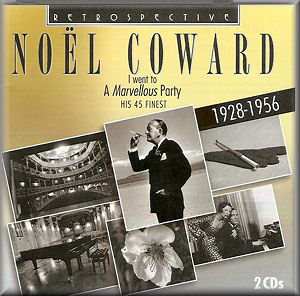 CD Reviews
CD Reviews MusicWeb
Webmaster: Len Mullenger
Len@musicweb.uk.net
[Jazz index][Purchase CDs][ Film MusicWeb][Classical MusicWeb][Gerard Hoffnung][MusicWeb Site Map]

Noël Coward – I Went To A Marvellous Party; his 45 Finest, 1928-56
Noël Coward with Yvonne Printemps, Gertrude Lawrence and
various accompanists
rec. 1928-56
![]() RETROSPECTIVE RTS 4168 [76:43 + 78:27]
RETROSPECTIVE RTS 4168 [76:43 + 78:27]
Buy
through MusicWeb
for £9.50 postage paid World-wide.
CD 1
1. Parisian Pierrot
2. Poor Little Rich Girl
3. A Room With A View
4. Dance, Little Lady
5. Lorelei
6. World Weary
7. I'll See You Again
8. Private Lives (With Gertrude Lawrence) Act 1 Love Scene
9. Private Lives (With Gertrude Lawrence) Act 2 Love Scene (Including Someday I'll Find You)
10. Half-Caste Woman
11. Any Little Fish
12. Mad Dogs And Englishmen
13. Twentieth Century Blues
14. Something To Do With Spring
15. Mad About The Boy
16. The Party's Over Now
17. Conversation Piece - Scene (With Yvonne Printemps) (Including I'll Follow My Secret Heart)
18. Mrs. Worthington
19. I Travel Alone
20. Most Of Ev'ry Day
21. Shadow Play - Scene (With Gertude Lawrence)
CD 2
1. We Were Dancing - Scene
2. The Stately Homes Of England
3. Where Are The Songs We Sung?
4. Dearest Love
5. I Went To A Marvellous Party
6. Never Again
7. The Last Time I Saw Paris
8. London Pride
9. Could You Please Oblige Us With A Bren Gun?
10. Don't Let's Be Beastly To The Germans
11. I'm Old-Fashioned
12. You'd Be So Nice To Come Home To
13. Wait A Bit, Joe
14. Nina
15. Matelot
16. Uncle Harry
17. Josephine
18. Sail Away
19. There Are Bad Times Just Around The Corner
20. Alice Is At It Again
21. Time And Again
22. A Bar On The Piccola Marina
23. Let's Do It, Let's Fall In Love
24. Let's Say Goodbye
This is a very acceptable two disc compilation of Coward’s recordings. The timeline is 1928-56, a rough quarter of a century which takes us from London Calling, his 1923 show represented by Parisian Pierrot, to The Globe Review of 1952. Interspersed are cabaret songs – two of the famous live June 1955 sequence from Las Vegas are here – as well as earlier songs from the 1930s, and a section named ‘Wartime songs.’ Thoughtful planning means that the shows are reasonably well represented, though sometimes the aural differences between the sides can be startling. It’s useful, chronologically for instance to have Cavalcade bisect The Third Little Show (which had Mad Dogs in it, and comes from slightly earlier in 1931) and Words and Music of 1932. However the selected recordings jump from 1932 to 1956 and even I, not especially troubled by this kind of thing, registered a gear-change.
Coward seems to have assumed the suave act from his earliest years. Parisian Pierrot was written when he was twenty four and its sophisticated lyrics take no prisoners. Many of the 1928 sides have Carroll Gibbons as piano accompanist – overlook the typo that puts the recording of Lorelei as 1926; it’s 1928. The two scenes from Private Lives tend to summon up Round the Horne’s ageing juvenile Binkie Huckaback and Dame Celia Molestrangler, but if Coward and Lawrence’s very stylised brittleness could survive lampooning in the 1960s it can certainly survive a good few more years yet.
I’ve always thought it pretty racy for Coward himself to have recorded Mad about the Boy for HMV in 1932. Though the vocal delivery is unusually stangulated, the sentiments are crystal clear. His French accent in the Conversation Piece extract, with the delightful Yvonne Printemps, is pure corn. My own favourite Coward song, I Travel Alone, is in the first disc
Most of the obvious choices are here, and some less well known ones too. We Were Dancing is a delicious waltz, finely played by the Phoenix Theatre Orchestra under Clifford Greenwood. Could You Please Oblige Us With A Bren Gun? was recorded in August 1941 shortly after he had set down the much better known London Pride. Later, in 1943, he recorded songs by Cole Porter and Jerome Kern with pianist Robb Stewart and they’re highly effective. He also sings The Last Time I Saw Paris, which Kern dedicated to Coward. I can’t say I’m a huge fan of Peter Matz’s New York supper club arrangements but they do have a sassy charm, I suppose.
But, as noted before, the selection is thorough and intelligent. The transfers are pretty decent too, though I would prefer more openness in the treble, especially in the 1928 -32 songs.
Jonathan Woolf